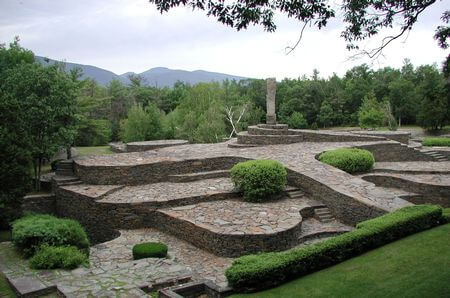Francis Karagodins is a senior at Bard College. He is a Brooklyn native, and he is an aspiring theater director.
His senior project will be a full production of the Greek tragedy Antigone at Opus 40, a sculpture park about a half hour from the picturesque campus in Annandale-on-Hudson that overlooks the Hudson River and Catskill Mountains.
Opus 40 is a sculpture park and museum with 50 acres of meadows, forested paths and bluestone quarries, including 6.5 acres of earthwork sculpture, in the heart of the Hudson Valley in Saugerties, New York.
Karagodins’s production of the Sophocles play will take place on May 15 and May 16. His essential cast will consist of six people and a Greek chorus.
“In Greek tragedy, three actors were used and they would play different parts,” Karagodins said. “For example, the person who plays Antigone’s sister in one scene may play her husband in another scene because they use masks. I don’t think I am going to use masks.”
Karagodins is a classics major, which involves learning ancient Greek and Latin. He has been translating this play from ancient Greek into English for the production. This will be his sixth production at Bard. He chose Antigone for his senior project for its timeliness.
“The problems addressed within Antigone are the same problems that we must address today,” Karagodins said. “Antigone relates to now in the sense that there is a lot of discussion about what is the right way to behave and the right way to legislate.”
Antigone’s brothers died and one of them was not allowed to be buried, as ordered by King Creon.
“Today we think a lot about contamination and what is right and wrong,” Karagodins said. “When we think about public health, we are thinking about the health of the state. In the ancient world, the health of the state was a more general notion.”
Opus 40 is a historic spot that has a connection to Bard College. Harvey Fite, a Bard professor and a sculptor, created the park (he started building it in 1939), which was originally a bluestone quarry. Some call his creation the Stonehenge of North America.
Fite came to Bard to establish its drama department and teach sculpture.
“Fite used instruments and machines to move the stones but he did so by himself, he had no helpers,” Karagodins said. “In 37 years working everyday, he made this landscape out of blue stone. The amount of discipline necessary to do this is beyond the experience and understanding of most people including myself.”
There is even a bell tower on Bard’s campus that Fite designed and his students built.
It is a vast landscape with space for performances. Fite’s crowning achievement was building Opus 40, which has an impressive array of staircases, slopes, walls, pools, moats, levels, passages and a 15-foot monolith at the highest topographical point.
Karagodins compared the process of making this structure to Michelangelo. Opus 40 is all blue stone with no cement used.
Karagodins pointed out that the Greek amphitheater was built within existing topography and the amphitheater at Delphi in Greece has as its background real mountains. The same is true at Opus 40.
The senior from New York thinks that people should visit this site in the Hudson Valley because it is a remarkable and impressive achievement of the mind and the body.
The production of Antigone will be the first official student production under a new cooperative agreement between Opus 40 and Bard College.
All the productions that Karagodins has directed have been located at historic locations. His first production took place at the Blithewood Manor, which is a 19th century mansion on campus. That was a production of Sophocles’s Electra.
His second production took place at Bard Hall, which is the oldest building on campus (built in 1852). He then did two short productions, both of which took place at Blithewood Garden and another production at Bard Hall
The senior has done two Shakespeare productions. One was Julius Caesar, which showed the events leading up to the political assassination of Julius Caesar. His other Shakespeare production was Richard III.
Karagodins was born in New York, moved to Riga, Latvia with his Latvian parents before first grade and moved back to Brooklyn after fifth grade.
Latvian is the director’s first language. His mother is a book binder and his father is a draftsman, which led him to think about composition.









